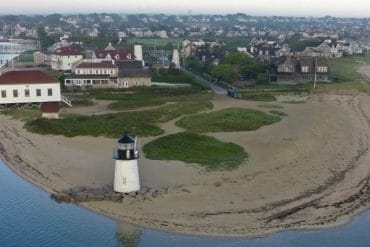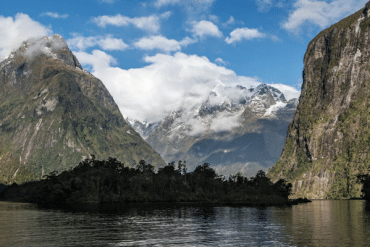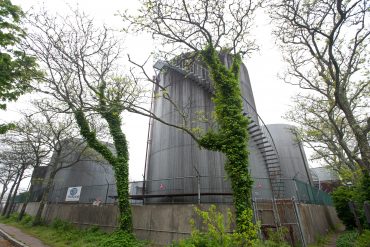Why aren’t Nantucket’s waters being protected like the rest of Massachusetts?
Charter boat captain Pete Kaizer was fishing for striped bass off the coast of Chatham last year when he started wondering why the Cape’s inshore waters were so abundant with fish compared to the depleted waters around Nantucket. His answer came when a state fisheries official sent him a color-coded map outlining commercial fishing restrictions. The map showed that “mobile gear” — essentially a net pulled through the water — is prohibited during all or part of the year in the inshore waters of 90 percent of the state’s coastal communities — virtually everywhere except the outer Cape near Provincetown, Martha’s Vineyard and Nantucket.
 For Kaizer and other Nantucket charter boat captains, the map explained why they’ve been seeing a dramatic decline in juvenile squid, which spawn in the waters around Nantucket and are critical forage food for stripers, bluefish and tuna. Just five years ago, squid could always be found near local fishing hotspots like Old Man Shoal. “Squid were everywhere,” says Tom Mleczko, a veteran Nantucket charter boat captain. “There was squid as far as you could see. In the last few years, that hasn’t happened. There aren’t any ‘squidos.’ Nothing is in the water.”
For Kaizer and other Nantucket charter boat captains, the map explained why they’ve been seeing a dramatic decline in juvenile squid, which spawn in the waters around Nantucket and are critical forage food for stripers, bluefish and tuna. Just five years ago, squid could always be found near local fishing hotspots like Old Man Shoal. “Squid were everywhere,” says Tom Mleczko, a veteran Nantucket charter boat captain. “There was squid as far as you could see. In the last few years, that hasn’t happened. There aren’t any ‘squidos.’ Nothing is in the water.”
Kaizer, Mleczko and other charter boat captains say fishing trawlers that drag their nets on the sandy bottom are destroying the masses of white squid eggs that dot the ocean floor. The trawlers are also scooping up adult squid before they’ve spawned. Moreover, they contend that squid are being overfished in federal waters, which begin three miles offshore. Last year, commercial fishing boats were allowed under existing federal rules to harvest 19 million pounds of squid between May and August, even though the quota for that period was only 8.4 million pounds. “It was a massacre,” Kaizer says. “We can’t keep beating up on this thing. It’s not sustainable.”
While Nantucket captains like Peter Kaizer see this as an environmental crisis, state fishing regulators appear to be more concerned with the economic interests of mainland commercial fishermen, who for years have been much more involved in the process of shaping fishing policies than the charter boat captains. Going up against the commercial fishing industry is not politically expedient, especially in recent years as many commercial fishermen are struggling to stay in business due to tighter federal fishing rules designed to rebuild stocks.
Nantucket might also be hampered by an image problem that comes from being a wealthy summer resort. While commercial fishermen harvest fish for commercial food markets, the Nantucket fleet of charter boats fish for the pleasure of their well-to-do clients. This makes it politically more difficult to add restrictions that harm the commercial fishermen.
 Fishermen have been pursuing squid commercially as both a delicacy and as bait since the 1800s. It’s become a significant industry, with preliminary landings in 2016 totaling nearly 40 million pounds. In recent years, squid boats have focused their efforts on the productive waters of Nantucket Sound and south of the island. The boats can often be seen just three miles offshore — as close as they can get to Nantucket while remaining in federal waters. Between 2007 and 2015, the area south of Nantucket was the most intensely fished area on the East Coast during the summer, according to data from Mid-Atlantic Fishery Management Council, which regulates the fishery in federal waters.
Fishermen have been pursuing squid commercially as both a delicacy and as bait since the 1800s. It’s become a significant industry, with preliminary landings in 2016 totaling nearly 40 million pounds. In recent years, squid boats have focused their efforts on the productive waters of Nantucket Sound and south of the island. The boats can often be seen just three miles offshore — as close as they can get to Nantucket while remaining in federal waters. Between 2007 and 2015, the area south of Nantucket was the most intensely fished area on the East Coast during the summer, according to data from Mid-Atlantic Fishery Management Council, which regulates the fishery in federal waters.
Nantucket’s charter boat captains and their environmentalist allies are working on two fronts to curtail this commercial fishing pressure. At the federal level, they’re lobbying regulators to change the rules. While at the state level, they are pushing a bill that would ban all mobile gear in state waters around Nantucket from May through October. So far, they are seeing more success with the feds.
The Mid-Atlantic Fishery Management Council in June endorsed a package of regulatory changes that would limit the future expansion of the fishery and reduce the squid catch in summer months when squid are spawning. Squid are easier to catch when they are spawning because they aggregate. Females lay as many as three hundred eggs encased within gelatinous capsules that are anchored to the seafloor. Dragging their nets on the bottom, fishing trawlers dislodge the capsules from the ocean floor.
While some squid fishermen contend that this process helps distribute the eggs, researchers contend otherwise. Working with squid in captivity, Roger Hanlon, a senior scientist at the Marine Resources Center in Woods Hole, found that dislodging eggs causes the eggs to hatch prematurely. Because their stomachs have yet to be fully formed, they are unable to eat. “Those animals do not survive,” he says. “They are all dead.”
Joseph Gordon, the manager of U.S. oceans in the Northeast for The Pew Charitable Trust, says the new rules, which still need final approval from National Oceanic and Atmospheric Administration, would allow for more squid to reach maturity. “Reducing the effort in the summer months is a great conservation gain for the coast and the overall population,” he says.
 Kaizer, who had attended the council’s June meeting in Norfolk, Virginia, says the council’s decision is good news for Nantucket because a healthy squid population is critical to the health of other fish populations. Still, Kaizer plans to keep pushing for more protections. He wants federal regulators to put the federal waters around Nantucket off limits to fishing during the summer, in effect creating a “buffer zone” around the island. California, South Africa and Tasmania have implemented similar closures.
Kaizer, who had attended the council’s June meeting in Norfolk, Virginia, says the council’s decision is good news for Nantucket because a healthy squid population is critical to the health of other fish populations. Still, Kaizer plans to keep pushing for more protections. He wants federal regulators to put the federal waters around Nantucket off limits to fishing during the summer, in effect creating a “buffer zone” around the island. California, South Africa and Tasmania have implemented similar closures.
Kaizer and his allies are also pressuring the Massachusetts fisheries regulators to do more to protect spawning squid in state waters. The Commonwealth currently allows squid fishing in these areas from April 23 through June 9, although the state sometimes extends the season for a week or two. But the problem, Kaizer says, is not just the squid boats but any fishing boat that drags gear along the ocean bottom. “You tow small mesh around, you are going to catch everything,” Kaizer says. “It’s like sterilizing Nantucket.”
Last year, the town of Nantucket petitioned the state to ban such gear in state waters around Nantucket from May 1 to Oct. 31. In March, about two hundred packed the Police Station community room for a hearing on the town’s request with David Pierce, the director of Massachusetts Division of Marine Fisheries.
Pierce declined requests to be interviewed for this story. In a written statement, he says the petitioners had not provided justification for their measure. In a December memo to the Marine Fisheries Advisory Commission, Pierce said there are no scientific studies that prove that disrupting squid mops reduces the survival of eggs. In addition, despite years of fishing pressure, there is no evidence that squid are being overfished, he said. Closing state waters around Nantucket, he said, will displace trawlers to the remaining open areas and lead to more gear conflicts in the center of Nantucket Sound. Pierce would face fierce backlash from commercial fishermen if he put Nantucket waters off limits. It would be easier if commercial fish stocks were healthy and commercial fishermen had other places to go.
 Still, Kaizer and his allies continue to push for the bill banning all mobile gear in the state waters around Nantucket from May through October. The bill’s Senate sponsor, Sen. Julian Cyr, who represents the islands and Cape Cod, said current rules restricting mobile gear in the state’s inshore waters are sorely out of date. Put in place in the 1930s and 1940s, the rules protected the interest of fishermen who used fish weirs, which have since steadily disappeared from the coast. Although those gear conflicts also existed in Nantucket, it’s unclear why similar restrictions were not put in place around the island, he says.
Still, Kaizer and his allies continue to push for the bill banning all mobile gear in the state waters around Nantucket from May through October. The bill’s Senate sponsor, Sen. Julian Cyr, who represents the islands and Cape Cod, said current rules restricting mobile gear in the state’s inshore waters are sorely out of date. Put in place in the 1930s and 1940s, the rules protected the interest of fishermen who used fish weirs, which have since steadily disappeared from the coast. Although those gear conflicts also existed in Nantucket, it’s unclear why similar restrictions were not put in place around the island, he says.
Commercial fishermen oppose the bill. Ed Barrett, president of the Massachusetts Bay Ground Fishermen’s Association, said it would be a mistake for the state to allow “Not-In-My-Backyard” pressure from Nantucket charter boat operators to overturn longstanding regulations that are based on science and sound fishing management practices. The Marshfield commercial fisherman said it would set a “terrible” precedent if Nantucket succeeded in passing a law to implement a fishing ban.
Commercial fishing interests wield more power over state fishing policies than the sports fishing industry. The nine-member Marine Fisheries Advisory Commission, which would vote on any regulatory changes affecting Nantucket, is dominated by commercial fisherman. The issue has yet to come before the commission for a vote. Michael Pierdinock, one of only two recreational fishermen on the board, says he’s not sure how he would vote. While he is sympathetic to the Nantucket charter boat operators, there is no direct scientific evidence that scraping squid mops off the seafloor is killing the eggs, he says.
The only scientific work has been conducted on squids in captivity. Hanlon, the scientist at Marine Resources Center in Woods Hole, says conducting a study in the wild would be extremely difficult, and there is no funding source to pay for a study. Other factors, such as climate change and increased seal populations, could also explain why squid are in decline near Nantucket, says Pierdinock, who operates a charter boat based in New Bedford.
 The issue is a tough one politically, Pierdinock says. Many commercial fishermen are already struggling financially due to new fishing closures on Stellwagen Bank, a marine sanctuary at the mouth of Massachusetts Bay. Adding new restrictions around Nantucket would impose a real hardship on them, he said. “I would not want to push the commercial fishermen out of business based on the lack of science,” he says.
The issue is a tough one politically, Pierdinock says. Many commercial fishermen are already struggling financially due to new fishing closures on Stellwagen Bank, a marine sanctuary at the mouth of Massachusetts Bay. Adding new restrictions around Nantucket would impose a real hardship on them, he said. “I would not want to push the commercial fishermen out of business based on the lack of science,” he says.
Kaizer believes the state’s refusal to grant protections to Nantucket is the result of pressure from the commercial fishing industry. Ironically, he says, the state limits the use of bottom-dragging gear in waters near its commercial fishing ports like Gloucester and New Bedford. “Everyone else is fat and happy,” he says. “They’re not saying much because they got the protection.” He says people in those communities aren’t interested in helping Nantucket. That means Nantucket must fight this battle on its own.






